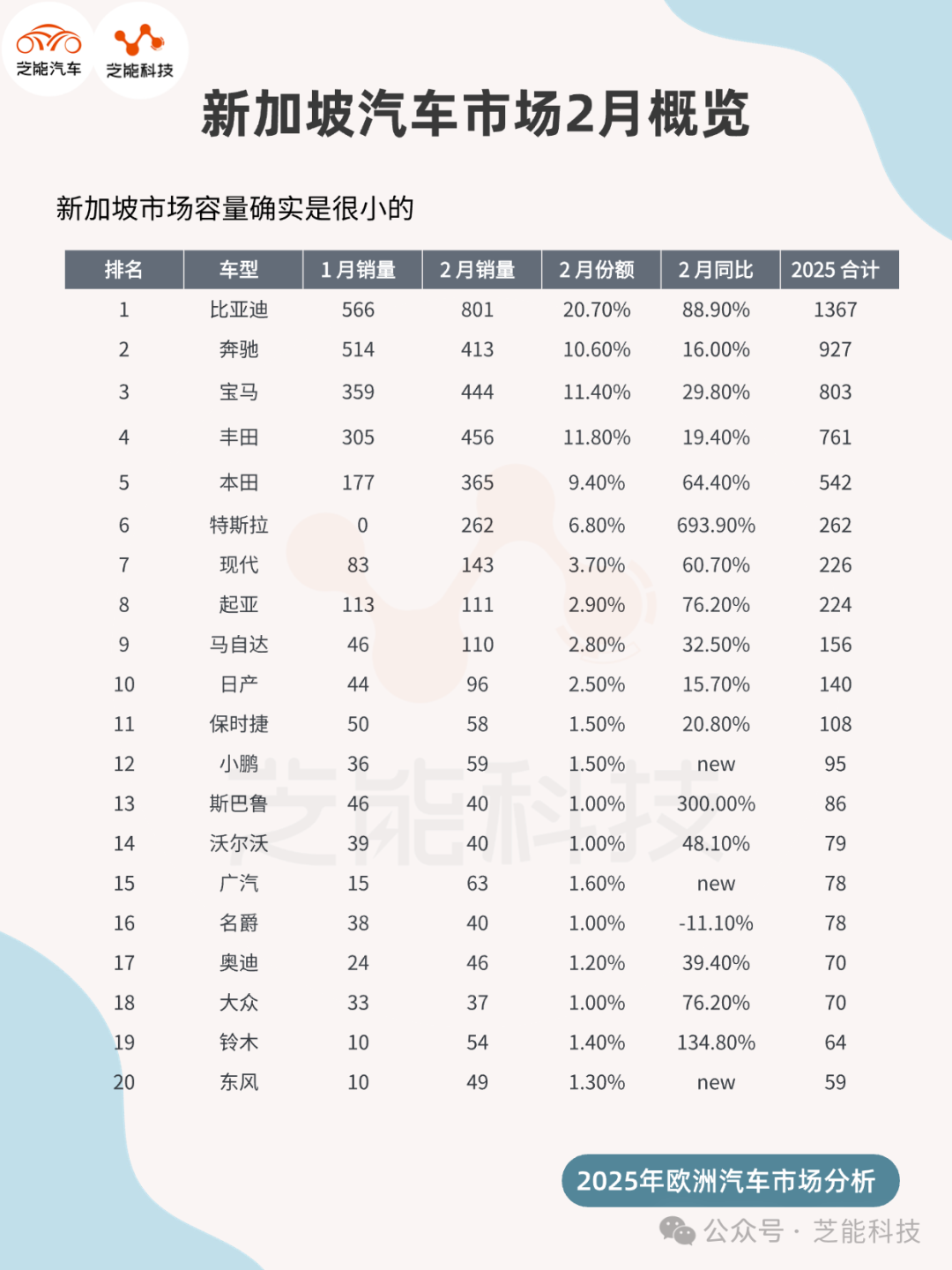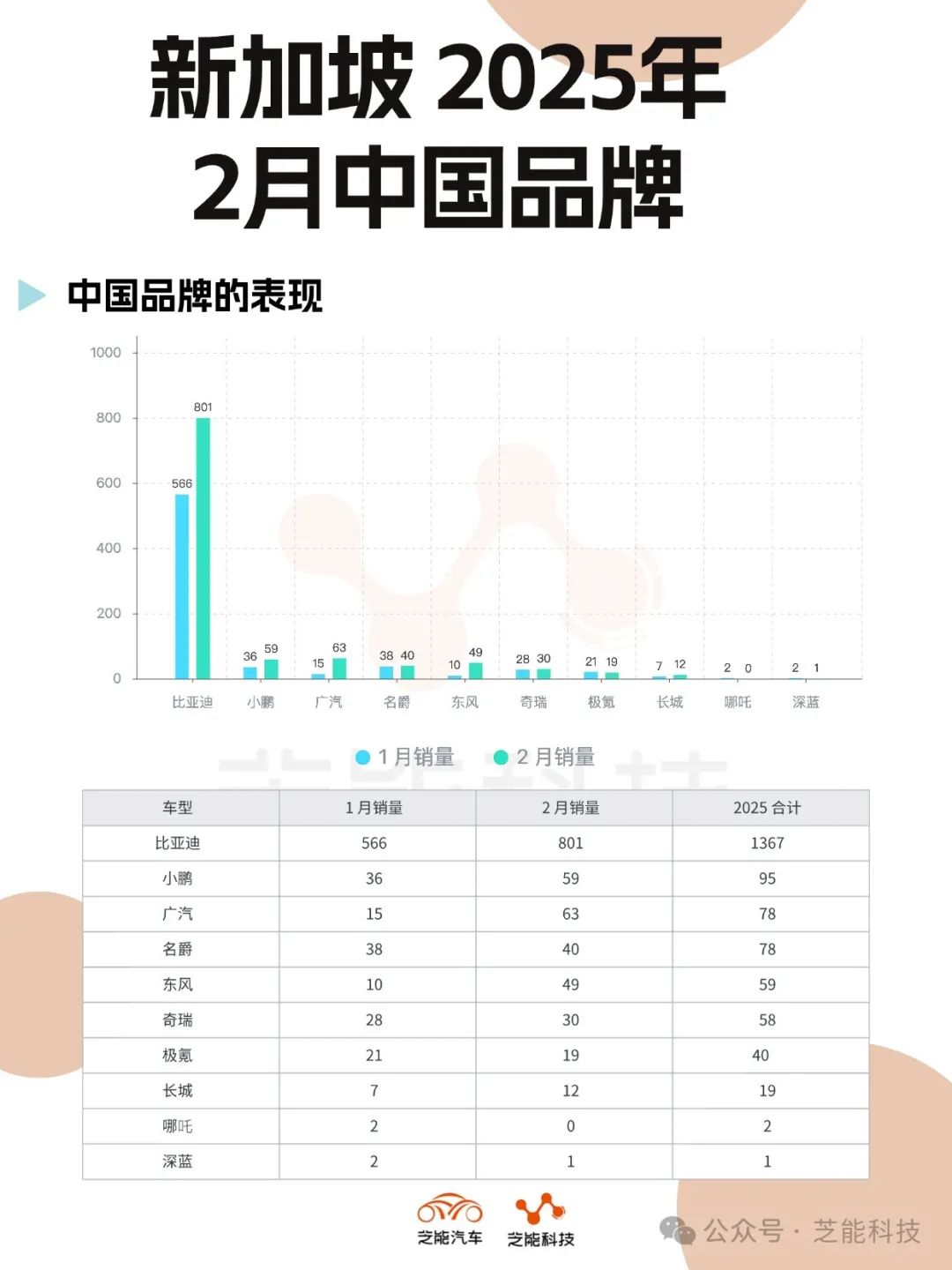Asian Auto Market | Singapore February 2025: BYD Maintains Top Spot for Three Straight Months
![]() 03/18 2025
03/18 2025
![]() 612
612

Singapore's new car market surged 60.6% year-on-year in February 2025, with sales reaching 3,878 units. From the beginning of the year to February, cumulative sales stood at 6,581 units, a 41.4% increase compared to the same period last year. This robust growth was fueled by a decline in Certificate of Entitlement (COE) prices, which stimulated market demand.
BYD led the market for the third consecutive month with a 20.7% market share, and sales jumped 88.9% year-on-year. While traditional brands such as Toyota, BMW, and Mercedes-Benz remained prominent, they struggled with growth. Tesla and Honda, on the other hand, performed well. Chinese brands including GAC, Xpeng, and Dongfeng also ranked among the top performers.
01 Singapore Sales Overview - February 2025
Singapore's new car market exhibited robust growth in February 2025, with total sales reaching 3,878 units, an increase of 60.6% from the previous year. Cumulative sales from the beginning of the year to February amounted to 6,581 units, a 41.4% year-on-year rise. This growth was attributed to the decrease in COE prices, a unique cost factor for car purchases in Singapore that directly impacts market activity.
From a Powertrain Perspective
● Electric Vehicles (EVs) continued to gain market share, with BYD and Tesla leading the charge with significant sales increases.
● Traditional gasoline vehicles and hybrids, supported by brands like Toyota and Honda, saw their growth rates lag behind EV-driven brands.

In Terms of Brand Sales
● BYD topped the list with 801 units sold, accounting for a 20.7% market share, and sales surged 88.9% year-on-year. Cumulative sales from the beginning of the year to February stood at 1,367 units, significantly ahead of the competition.
● Toyota ranked second with 456 units (11.8% share), followed by BMW with 444 units (11.4%) and Mercedes-Benz with 413 units (10.6%). However, their year-on-year growth rates (19.4%, 29.8%, 16%) were below the market average, indicating that traditional luxury and mainstream brands are struggling with competitiveness amidst the electrification wave.
● Honda came in fifth with 365 units (9.4%) and a 64.4% year-on-year increase. Tesla soared to sixth place with 262 units (6.8%) and an astonishing 693.9% year-on-year growth, reflecting its strong recovery in the EV market.
● Hyundai, Kia, Mazda, and Nissan ranked in the middle with 143 units (3.7%), 111 units (2.9%), 110 units (2.8%), and 96 units (2.5%), respectively, and growth rates ranging from 15.7% to 76.2%, showcasing stable performance.
Chinese Brands Shine
In addition to BYD's dominant position, Xpeng ranked 12th with 59 units (significant year-on-year growth), GAC ranked 11th with 63 units (78 units year-to-date), and Dongfeng ranked 15th with 49 units (59 units year-to-date). Chinese brands are rapidly increasing their market penetration.
Other Chinese brands such as Chery (30 units), MG (40 units), Zeekr (19 units), and Great Wall (12 units) also recorded sales, while NIO (0 units) and SL03 (1 unit) performed weakly.
Overall, Chinese brands have secured a significant position in the Singapore market with their EV products and price advantages, particularly dominating the EV segment.

02 Competitive Landscape Analysis
Singapore's automotive market is experiencing a clear trend of polarization:
● On one hand, EV forces represented by BYD and Tesla are rapidly rising, capturing the market with technological and cost advantages.
● On the other hand, traditional brands such as Toyota, Mercedes-Benz, and BMW, while maintaining stable sales, lack growth momentum and face pressure from the transition to electrification.
BYD's market share has exceeded 20% for three consecutive months, benefiting from the growing demand for EVs and its diverse product line (including the Atto 3 and Seal). Tesla rebounded from zero sales in January to 262 units in February.
The decline in COE prices is the direct catalyst for the surge in sales, while the Singapore government's policy support for EVs (such as tax incentives and charging infrastructure construction) has provided fertile ground for the expansion of BYD, Tesla, and Chinese brands.
The future competitive landscape will hinge on the speed of EV penetration and whether traditional brands can accelerate their transformation to cope with the low-cost competitive advantages of Chinese brands.
Summary
BYD's leadership with a 20.7% market share, combined with Tesla's strong rebound and the collective rise of Chinese brands, signifies the emerging reshaping of the market landscape in Southeast Asia's automotive industry by EVs.







